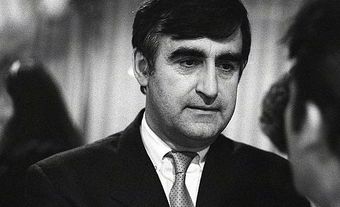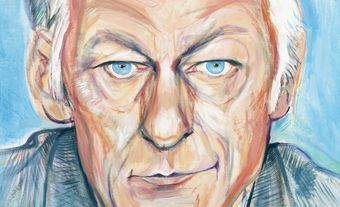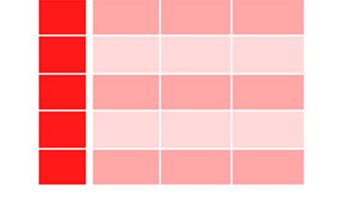Jean Lesage, PC, CC, premier of Québec 1960–1966, politician, reformer, lawyer (born 10 June 1912 in Montréal, QC; died 12 December 1980 in Québec City, QC). Known as the father of the Quiet Revolution, he led his province during that modernizing period of profound change in the collective life of Québec.

Early Life
Lesage was born in Montréal, one of five children born to Cécile Côté and Xaveri Lesage. In 1921 the family moved to Québec City, where Xaveri, a teacher and civil servant, took up a managerial position with an insurance company. Lesage attended the private school Saint-Louis-de-Gonzague and the Quebec Seminary before enrolling in law at Laval University. A talented student, he became active in Liberal Party politics in university, and graduated in 1934.
Admitted to the Bar that same year, Lesage practiced in private law with various Québec City firms, and served as Crown attorney for the Wartime Prices and Trade Board for most of the Second World War. In 1938, he married Corinne Lagarde, a singer. He also served in the army reserve from 1939–1945.
Federal Politics
Lesage ran for public office in the federal election of 1945 and was elected the Member of Parliament for Montmagny-L'Islet, sitting with the Liberals under Prime Minister William Lyon Mackenzie King. Lesage was re-elected in 1949, 1953, 1957 and 1958. In his early years in the House of Commons he served as parliamentary secretary to various government ministers before joining the Cabinet of Prime Minister Louis St-Laurent from 1953–1957. He served as minister of resources and development, and then as minister of northern affairs and national resources.
Although the St-Laurent government was defeated in 1957, Lesage re-captured his own seat both that year and in 1958, when John Diefenbaker's Progressive Conservatives won their huge majority. Slumping Liberal fortunes in Ottawa convinced him to seek the leadership of the Québec Liberal Party, which he won on 31 May 1958. He completely rebuilt the party by attracting dynamic new people and by preparing a program — radical for its time — of social and political reform.
1960 Election
In the provincial election of 1960 Lesage fought to unseat the Union Nationale (UN), which under Maurice Duplessis and his successors Paul Sauvé and Antonio Barrette had ruled Québec continuously, and with an iron fist, for the past 16 years. Not only was the UN considered corrupt, overseeing a wide system of political patronage, it was also socially conservative, isolationist, and closely allied with the Roman Catholic Church.
Lesage's Liberals, on the other hand, put themselves forward as leaders of the new Québec — progressive, urban and modern — a message that resonated in a province on the cusp of the Quiet Revolution. Lesage campaigned with the slogan "C’est le temps que ça change," It's time for a change. The election was boisterous and ugly, with personal attacks on both sides, and hot tempers among voters, as Québécois debated the merits of change. On 22 June 1960 Lesage's Liberals won a narrow but historic victory, pushing the UN from power and capturing 51 of 95 legislature seats. Lesage himself was elected in the riding of Québec West. He became the province's 19th premier, also taking on the posts of minister of finance and later, minister of revenue and minister of federal-provincial affairs.
Lesage Government
Whether or not Lesage led the Quiet Revolution, his reform-minded government created the social, political and economic conditions and structures that allowed it to flourish. As historian Claude Bélanger has written, "the government of Jean Lesage became the symbol and the tool of a whole people on the road to self-assertion."
Modernizing Québec society and secularizing it — pulling it out from under the thumb of the Catholic church — were Lesage's main goals. But the premier was also pushed, often faster than he liked, by activists within his own Cabinet, including René Lévesque, Pierre Laporte and Eric Kierans. With them he pursued an ambitious agenda of eliminating patronage and corruption, and building up a skilled provincial bureaucracy to govern newly created ministries of cultural affairs, federal-provincial relations, and education.
Education reform was perhaps the greatest example of Lesage's secularizing measures. The public school system, previously controlled by the church, was instead placed under the new Ministry of Education, whose aim was to produce a skilled labour force and instill Québécois values. School districts were reorganized, schools were merged, and plans were laid for the creation of Collèges d’Enseignement Général et Professionnel (CEGEPs).
Hydro-Québec
Lesage's most ambitious project, and arguably his greatest legacy, was the nationalization of 11 privately-owned electricity companies. With Lévesque as its point-man on the project, the government secured $300-million in financing from New York banks (after being denied loans in Montréal and Toronto) and bought-out the private companies, folding them into the public utility Hydro-Québec. The province's vast hydro-electric resources, the government claimed, would be used to fuel the province's development and the growing, nationalist aspirations of its people.
Lesage called a snap election in 1962, which became an effective referendum on the Hydro-Québec plan. The Lesage slogan this time was "Maîtres chez nous," Masters in our own house. His government was rewarded with a larger majority.
Costly Reforms
Lesage continued his government's program of change after 1962. There was ongoing reform in education, and the creation of new enterprises such as the Société générale de financement (to raise capital for francophone business), the Société de Montage Automobile (which assembled French cars) and the Société Québécoise d’Exploration Minière (which oversaw the development of mining and royalties).
Insisting that Ottawa pay for, but not control social programs in the provinces, Lesage's government ensured that the national medicare system would develop not as a federally-imposed insurance scheme but as a shared, federal-provincial program. Lesage also created the Québec Pension Plan, becoming the only premier to opt out of the Canada Pension Plan.
Whatever the merits of these changes, they were expensive. To pay for them Lesage raised taxes and borrowed heavily, increasing the provincial net debt by more than 300 per cent between 1960 and 1966. Many of the government's reforms, particularly in education, were also deeply unpopular in rural areas (heavily represented in the legislature) where the Quiet Revolution had not yet reached. Lesage would pay a price for neglecting these tradition-bound voters.
Defeat
For six years Lesage had capitalized on — and crested — a growing nationalist wave that was increasingly at odds with the rest of Canada and the federal government. Separatist terrorists had by then started bombing mailboxes and armouries in the name of "independence." By 1966, Lesage was finding nationalist sentiment difficult to contain; the Union Nationale, under the new leadership of Daniel Johnson, had also climbed on the same bandwagon. In the provincial election that year — which few expected Lesage to lose —the UN defeated him, winning 56 seats to the Liberals' 50.
"I have been at the disposal of my province," were among Lesage's last words on election night.
Lesage remained on as Liberal leader, and Leader of the Opposition in the National Assembly, until he was replaced as party leader by Robert Bourassa in 1970. After retiring from politics, he served as a board member for numerous corporations, until his death in 1980. Lesage was named a Companion of the Order of Canada, the country's highest civilian honour, in 1970. Québec City's international airport is named in his memory.

 Share on Facebook
Share on Facebook Share on X
Share on X Share by Email
Share by Email Share on Google Classroom
Share on Google Classroom


